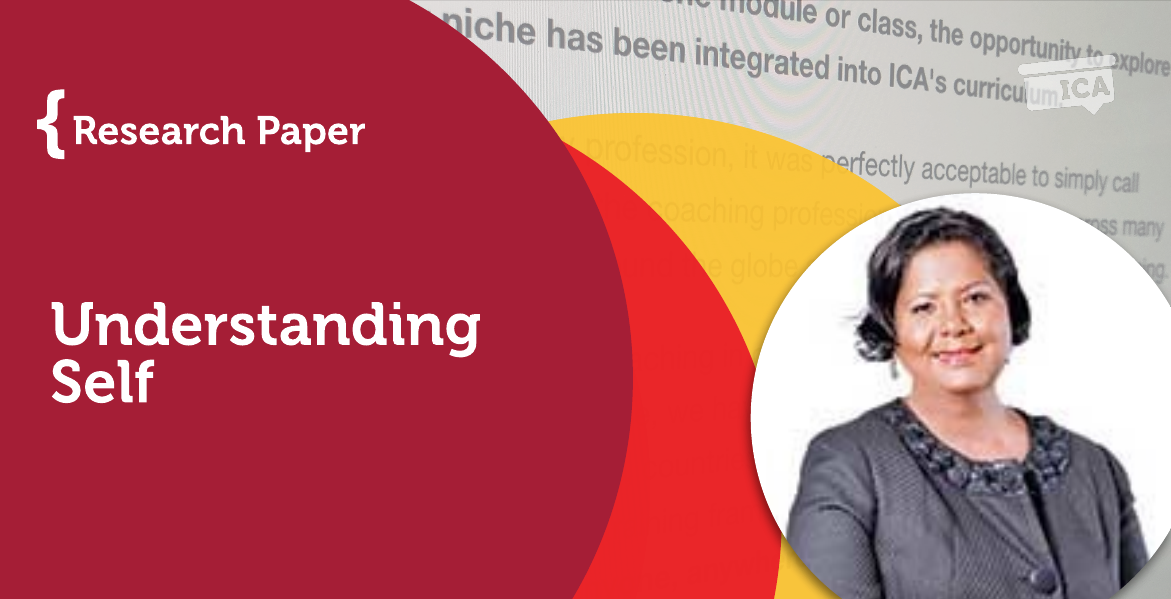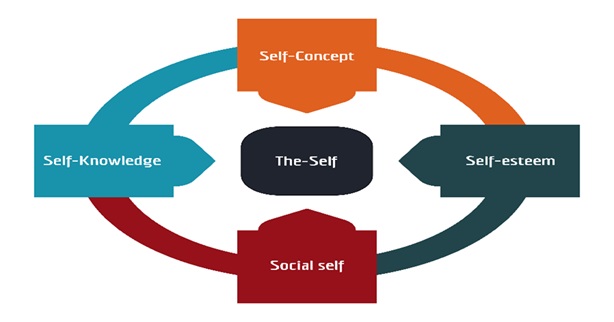 Research Paper By Isha Reuben-Theodore
Research Paper By Isha Reuben-Theodore
(Business Coach, TRINIDAD AND TOBAGO)
Introduction

The area of interest that I have selected for my research paper is Understanding Self and with the above quote uppermost in my mind. My greatest asset is understanding who I am, which from a very young age I was fortunate to be able to do, to know what drives me, what I like and what I certainly did not like. Where did this high level of self-awareness come from, I do not know, but this has been my driving force in all areas of my life. I rarely do anything without a full comprehension of what it means to me and how I will benefit, and the challenges involved.
This asset has allowed me to find peace along the way and to be able to acknowledge when I am stepping outside of “myself” as that sense of peace disappears. But understanding who I am allows me to find solutions that work for me in difficult areas, notwithstanding that it has been and continues to be a challenging process.
Definitions
What is the meaning of being true to yourself?
As per the Cambridge dictionary, it is “behaving according to your beliefs and doing what you think is right.”
It is my opinion that understanding yourself (self-knowledge) is critical to be able to live “according to your beliefs and doing what you think is right.” The first part of this research paper, therefore, defines self and looks at the components of self, as shown in the diagram below.
What is Self?
To adequately cover the meaning of Self, the two main aspects of the Self: Eternal Self/Inner Self and Temporary Self need to be looked at.
Inner Self describes the Eternal Self and speaks to the soul or spiritual heart. The quote from the bible “The kingdom of God is within” refers to the “spirit “that is within each of us, our soul and therefore our inner self.
The temporary Self is the physical self. The elements that comprise our temporary Self or physical Self are our name, our physical body, our gender, our profession, our age.
Another definition of Self is as follows:
The self is a person as the object of his or her reflective consciousness. whereby reflective consciousness is continuous awareness of your thoughts, emotions, and behaviours.

There are four areas to be considered in the process of Understanding self, that is, self-concept, self-esteem, social self, and self-knowledge. The following seeks to define each one and the interrelationship, but the most important one for me is self-knowledge. The research paper is centred on this.
Self-Concept
Self-concept combined with self-esteem, self-knowledge, and the social self-forms the self as a whole. It includes the past, present, and future selves, where future selves (or possible selves) represent individuals’ ideas of what they might become, what they would like to become, or what they are afraid of becoming (The Coaching process allows us to reflect on our present selves to be able to achieve the future self that we have envisaged. Identification of future self with clear action plans on how to get there is key to the Coaching process.
Self-esteem is one’s own subjective emotional evaluation of their worth. It covers the beliefs about oneself, (for example, “I am capable,” “I am worthy”), as well as emotional states, such as triumph, despair, pride, and shame.
1] Smith and Mackie (2007) defined it by saying
The self-concept is what we think about the self; self-esteem, is the positive or negative evaluations of the self, as in how we feel about it.
The Coaching process helps us to reflect on our emotions (what we feel), enabling us to identify the underlying beliefs that are supporting those emotions.
Social Self: “Our social self is the one we show to other people.”
Self-knowledge is a term used to describe the information that an individual draw upon when finding an answer to the question “What am I like?”. Self-knowledge requires continuous self-awareness and self-consciousness, understanding of oneself or one’s motives or character
The wise writer Jiddu Krishnamurti once wrote,
If you begin to understand what you are without trying to change it, then what you are transforming.
The root of all change starts with self-understanding.
If you don’t understand yourself, your efforts will be lost and spent on things that are not under your control. Self-understanding, however, is a journey. There will always be new things to discover about yourself—and new paths to success because of that understanding. The aspect of self-knowledge allows us to focus on what is relevant and meaningful to us.
Self Application
UNDERSTANDING SELF and Self-Awareness
(ICA learning materials – Module on Creating awareness)
The key to self-knowledge is continuous self-awareness. Self-awareness is merely understanding who we are. In Maslow’s hierarchy, total awareness is seen as self-actualization, the highest level in the hierarchy.
The first step to self-awareness is recognizing that you want to! Learning more about yourself is part of growing as a person. If we choose not to gain self-awareness, then we stagnate and don’t grow!
5 Ways to Cultivate Self-Awareness
Create some space for yourself. Leave yourself some time and space every day – perhaps first thing in the morning or half an hour before sleep. Spend some time with yourself, reading, writing, meditating, and connecting with yourself.
Practice mindfulness. Mindfulness is the key to self-awareness. Jon Kabat-Zinn defines mindfulness as
paying attention in a particular way, on purpose, in the present moment, non-judgmentally.
Through mindfulness practice, you will be more present with yourself so that you can “be there” to observe what’s going on inside and around you.
Keep a journal: Writing not only helps us process our thoughts but also makes us feel connected and at peace with ourselves. Writing can also create more headspace as you let your ideas flow out onto paper. Research shows that writing down things we are grateful for or even things we are struggling with helps increase happiness and satisfaction. (Source)
Practice being a good listener. Listening is about being present and paying attention to other people’s emotions, body movements, and language. It is about showing empathy and understanding without constantly evaluating or judging. When you become a good listener, you will also be better at listening to your inner voice and become the best friend of yourself.
Gain different perspectives: Ask for feedback. Sometimes we can be too afraid to ask what others think of us –We all have blind spots, so it is helpful to gain a different perspective to see a fuller picture of ourselves.
Some of the critical benefits of self-awareness are
(ICA learning materials – Module on Creating awareness)
The above benefits can genuinely transform your life as so often our day to day lives reflect the absolute opposite to the benefits identified. Imagine what life would be like if we can practice the above and achieve those benefits!
Coaching Application
(ICA learning materials – Module on Creating awareness)
The concept of self-awareness is core to the success of coaching, and so an essential step in the coaching process is Creating Awareness which allows the client to become aware of who they are, the real issues being faced, their underlying beliefs and conflicts and goals and the action required to achieve those goals. In the coaching process:
- Self-knowledge forces the client to become self-aware and self-conscious.
- Self-concept will focus on the future or possible selves
- Self-esteem will reveal underlying beliefs and how you feel about yourself, both negative and positive.
Powerful questioning and effective feedback by the coach helps the client to do some soul searching that would discover beliefs and behaviours that are getting in the way of achieving their goals.
Using Powerful Questions
Powerful questions support your client in stopping in their pathway of thought and looking at a situation from a different perspective. Asking questions will assist your clients in knowing more about themselves and what they need to do.
Effective Feedback or Outlining Observations
Another way coaches can create awareness with a client is by using feedback. Feedback is an observation. It is information that we have noticed, discerned, or are picking up from what they are saying. The difference between feedback and advice is that feedback is nonjudgmental.
Useful feedback creates a kind of awareness that makes a difference in how one sees things. It is neither positive nor negative. It is simply feedback. By stating what is or what is not from another perspective, it may just help your client get the insight they can use.
Underlying beliefs
(ICA learning materials – Module on Underlying Beliefs)
Self-awareness is the first step to understanding what lays below the surface. It is the conscious observation of the way we think and act. Such awareness opens an opportunity to see what the core beliefs are that drive your actions.
Beliefs are ideas, thoughts, and assumptions we perceive as absolute truths. Many of our beliefs were formed and accumulated throughout our childhood, and they are formed through our experiences and interactions with the world and make up our mental model.
When looking to identify an Underlying Belief that eludes us, it can be useful to first look at the emotions that our thoughts cause us to feel. Your feelings are a barometer of your thoughts and beliefs.
When your thoughts and beliefs serve and support you in achieving your goals, they will leave you feeling balanced and empowered.
When there are Underlying Beliefs at work that may sabotage your stated goals, you will find yourself feeling inadequate, frustrated, or disempowered. Quite often, we believe that our behaviour is based on reality or truth.
Thoughts lead to our emotions and then our behaviours. Self-awareness allows us to make changes in behaviour and beliefs.
Conclusion:
I chose to research on this topic of Understanding Self because I am very interested in what makes us who we are. That self-discovery is critical to living a meaningful and purpose-filled life. But each one’s life purpose is different, so how do we find out what is our life’s purpose and what drives us. My experience to date indicates that self-awareness that leads to self-understanding is a significant driver in this process of self-discovery.
The coaching process embodies self-discovery, but the extent of that self-discovery will depend on both client and coach. Self-discovery allows us to understand our thoughts, emotions, and behaviours. We are then better equipped to live a meaningful life, in that, positive and uplifting emotions and behaviours we maintain while we find ways to remove negative emotions and actions.
The challenge is that very often we are aware of negative thoughts and emotions and behaviours, so why is it so difficult to change them. This again is where a deeper aspect of self-awareness becomes essential, that aspect of soul searching. The process of soul seeking is the same as the process of increasing your self-awareness. Soul searching is to find the joy and love that is the essence and core of your soul. Your soul is a courageous divine light of source purity and love. (5)
Understanding the inner self is a journey and takes time. However, as noted under the heading Self-knowledge: The root of all change starts with self-understanding. If you don’t understand yourself, your efforts will be lost and spent on things that are not under your control.
The coaching process helps us to gain self-understanding, allowing us to live successful lives!
Resources:
Singh, Shweta. (2017). Parenting style about children’s mental health and self-esteem: A review of the literature. Indian Journal of Health and Wellbeing, 8(12), 1522.
Website Title: 【Self-concept theory, https://www.youtube.com/watch?v=LUdk0arNcn4
Self Help Pdf – lulubookreview.com,
(ICA learning materials – Modules on Underlying Beliefs, Creating Awareness)
Author, Jessie Zhu, what is Self-Awareness and Why is it Important? [+5 Ways to Increase It] https://positivepsychology.com/self-awareness-matters-how-you-can-be-more-self-aware/
Title: Your Health and Wellness.: THE ABCS OF SPIRITUAL SELF … https://african-care.blogspot.com/2018/08/the-abcs-of-spiritual-self-awareness.html
Creating Awareness. [ONLINE] Available at https://s3.amazonaws.com/coachschool/modules/ICA-CoachingPresence-CreatingAwareness.pdf. [Accessed 20 September 2019]
YouTube. 2019. Self-Concept theory. Udk0arNcn4. [Accessed 20 September 2019].
Wikipedia. 2019. Self-Esteem. Self-esteem. [Accessed 20 September 2019].
Self & Cooley’s looking glass self – SlideShare. [ONLINE] Available at https://www.slideshare.net/huxaifaqureshi5/self-cooleys-looking-glass-self. [Accessed 20 September 2019].
[ONLINE] Available at https://www.goodreads.com/quotes/296110-if-you-begin-to-understand-what-you-are-without-trying. [Accessed 20 September 2019].
Positive psychology. 2019. [ONLINE] Available at https://positivepsychology.com/self-awareness-matters-how-you-can-be-more-self-aware/. [Accessed 20 September 2019].
Dr Fathi El-Nadi: Management and Human Resources [ONLINE] Available at https://fathielnadi.blogspot.com/2012/04/. [Accessed 20 September 2019].